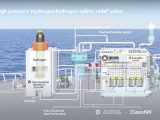
Hydrogen Aviation Soars: Advent Technologies Delivers Advanced MEAs to Airbus
September 12, 2025Advent Technologies and Airbus have made waves with a major milestone in hydrogen aviation. Thanks to the Airbus Advent collaboration, they rolled out redesigned high-temperature membrane electrode assemblies—HT-PEM MEAs—at Airbus’ test site in Toulouse. It’s a huge leap toward zero-emission commercial flights and lines up perfectly with the aviation industry’s push to cut greenhouse gases. Plus, it fits neatly into Airbus’s bold ZEROe promise of carbon-neutral air travel by the 2030s.
If you haven’t crossed paths with Advent Technologies (NASDAQ: ADN) before, they’ve been pioneering hydrogen fuel cell tech since 2012. From defense contracts to electric mobility, they’ve built a solid track record—and their latest passion project is all about hitting the skies. Backed with €34.5 million from the EU-funded RHyno project, Advent has been ramping up production of MEAs and electrolyzers. Now, by teaming up with Airbus’ world-class R&D, this collab is primed to shake up sustainable aviation.
Technology Breakthrough: High-Temperature MEAs
The idea’s refreshingly straightforward: crank up the operating temperature of fuel cells to pack more punch into a smaller package. At the heart of this innovation are HT-PEM MEAs, the core where hydrogen and oxygen tango at higher temps to generate electricity. By running hotter, you need tinier radiators, which trims weight and drag—absolute game-changers when every kilo counts onboard an aircraft.
Compared to their low-temperature cousins, these assemblies shrug off carbon monoxide in the hydrogen feed and heat up or cool down in a flash. That means simpler plant designs and lightning-fast start-ups—vital for airlines racing against the clock. During grueling trials at Airbus’ Toulouse hub, the new MEAs held steady under rapid power swings and brutal temperature cycles. In other words, they’re battle-ready for flight certification.
Practical Applications: Solving Real-World Problems
With these beefed-up MEAs in their toolkit, Airbus engineers are eyeing them for hydrogen-electric propulsion systems on commuter and regional jets. Picture short-haul hops of 300–600 km, where old-school electric systems just can’t cut it because of space and weight limits. This hydrogen approach could flip the script on regional travel.
And it doesn’t stop at passenger planes. Defense, heavy-duty transport, off-grid power—you name it. Advent’s MEA advances are the perfect springboard into markets hungry for reliable, light, and efficient power sources. Pair that with Toulouse’s aerospace mojo, and suddenly you’re envisioning everything from mobile microgrids to unmanned aerial systems and sturdy energy hubs in far-flung areas.
Environmental and Economic Impact
Swapping kerosene burners for hydrogen-electric powertrains means only water vapor comes out of the tailpipe—no CO₂, no NOx. Considering aviation is chalking up around 2–3% of global greenhouse gases, these systems could shave off hundreds of thousands of tons of emissions each year. It’s a serious nudge toward cleaner skies.
On the home front, this alliance is a shot in the arm for the Occitanie region. Toulouse, the beating heart of European aerospace, boasts over 50,000 R&D pros. By showcasing this breakthrough locally—made in Occitanie, made for Europe’s future—the project fuels job growth, bolsters local manufacturing, and tightens the hydrogen value chain across the continent.
Building a Regional Hydrogen Ecosystem
This isn’t just about fuel cells; it’s sparking a whole hydrogen hub in Occitanie and beyond. Startups and university labs are pitching in to design on-site electrolyzers, storage tanks, and refueling stations. With expertise flowing in from France, Germany, and Greece, this pan-European network is driving costs down and speeding up rollouts across sectors.
Looking Ahead: The Path to Certified Flight
Next stop? Airbus will slot these advanced MEAs into prototype propulsion units and kick off ground tests later this year. They’ll start with taxi trials, then turn up the power during take-off runs to map out thermal behavior—step by step toward full flight certification in 2027. It’s all about gathering the real-world data that counts.
Meanwhile, Advent is fine-tuning its MEA stacks and support hardware to nail certification standards and prep for mass production. If all goes to plan, we’ll see these hydrogen fuel cell powertrains entering service in the early 2030s. It’s not just a win for hydrogen aviation, but a turbo boost for the broader hydrogen economy—across defense, mobility, and off-grid energy alike. The future of clean flight has never looked this promising.



 With over 15 years of reporting hydrogen news, we are your premier source for the latest updates and insights in hydrogen and renewable energy.
With over 15 years of reporting hydrogen news, we are your premier source for the latest updates and insights in hydrogen and renewable energy.